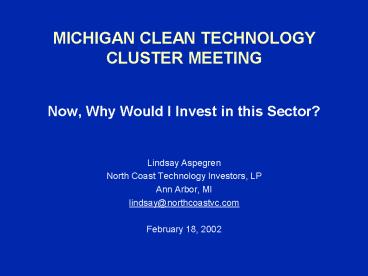MICHIGAN CLEAN TECHNOLOGY CLUSTER MEETING - PowerPoint PPT Presentation
1 / 14
Title:
MICHIGAN CLEAN TECHNOLOGY CLUSTER MEETING
Description:
North Coast Technology Investors, LP. Ann Arbor, MI. lindsay_at_northcoastvc.com. February 18, 2002 ... So When They Look at Clean Tech Venture Capital Investors See ... – PowerPoint PPT presentation
Number of Views:44
Avg rating:3.0/5.0
Title: MICHIGAN CLEAN TECHNOLOGY CLUSTER MEETING
1
MICHIGAN CLEAN TECHNOLOGY CLUSTER MEETING
- Now, Why Would I Invest in this Sector?
- Lindsay Aspegren
- North Coast Technology Investors, LP
- Ann Arbor, MI
- lindsay_at_northcoastvc.com
- February 18, 2002
2
What is Venture Capital?
- A classic financial intermediary.
- A successful venture fund must earn a compounded
cash on cash gross return in excess of 30 over
its ten-year life (22.5 net). - This return on investment is driven by multiples
(10x or greater) not the time value of money. - Core economics are based on (i) the pre-money
valuation of the next round, an estimate of (ii)
the number of financing rounds required until
liquidity, and (iii) the amount of money needed
in each round.
3
The Venture Capital Industry in the Late 1990s
- Historically unique time of wealth creation.
- In 1995, 9.9B was raised by venture capital
funds and 5.1B invested in private companies. In
2000, 104.6B was raised and 99.6B was invested. - Prior to 1995 it took a company 6.5 years to go
public. In 2000, it took 1.7 years. - 70 of all venture capital invested in the last
20 years was invested in 1999 and 2000. - The best product to sell is stock (never make a
product, never make a profit the
price-to-dreams ratio).
4
Then The Comet Hit the Earth
- Historically unique time of wealth destruction.
- The NASDAQ fell from 5027 on March 13, 2000 to
1397 on September 21, 2001. - In 2000, there were 226 IPOs valued at 21.1B. In
2001, there were 37 IPOs valued at 3.2B. With
some exceptions the IPO window will be shut for a
long time. - In 2001, only 40.6B of new capital was raised
by the venture capital funds and 36.5B was
invested in private companies - this was the
third largest year ever. - And a lot of dinosaurs are feeling really sick
today.
5
What Does All of This Mean for Venture Funding?
- You dont have to compete against those web guys
anymore! - There is 100B of uninvested venture capital
raised by funds that has yet to be invested in
private companies. - Multiple reasons to be optimistic
- Economy is bottoming
- Considerable evidence of sectoral tolerance for
new targets - Less competition for classic economic inputs and
- Gloomy investment climate leads to more
reasonable valuations for early-stage
investments.
6
What Does This Mean for Clean Tech?
- Most Clean Tech companies are presumed to fit
in the NVCAs Energy/Industrial category. This
is not a good thing. - In 1995, 0.3B or 0.6 of venture capital
investment went into Energy/Industrial category.
In 2000, this increased to 1.4. This is falling
back to 1.0 in 2001. - The number of Energy/Industrial category IPOs has
declined from 16 in 1996 to 6 in 2000 and 1 in
2001. The trend is toward less mature,
speculative companies which is a double-edged
sword. - Clean tech is a statistically marginal category
of investment for the venture capital industry.
7
What are Venture Capital InvestorsLooking for. .
.
- A growing market of reasonable size with an unmet
need for a product or service. - Novel technologies where you can quickly get to
proof of concept and create barriers to entry. - A strategy for partnering so that the risks
associated with market acceptance and timing can
be shared with someone else. - Clear economics and capital efficiency.
- A kernel of a management team.
8
Still, There Remains Unlimited Potential for
Mistakes. . .
- Investing in a technology that has not achieved
proof of concept. - Investing in a technology that works, only to
find out that no one cares.
9
Still, There Remains Unlimited Potential for
Mistakes. . .
- Backing a company with weak management or board
of directors. - Investing as part of a weak syndicate of
investors. - Botching the estimated market size and/or
botching the valuation.
10
Still, There Remains Unlimited Potential for
Mistakes. . .
- Betting on the timing of a customer deal,
corporate partnering deal, or IPO. - Investing in a company where success is dependent
on changing the way the industry works or
customers behave.
11
Still, There Remains Unlimited Potential for
Mistakes. . .
- Investing in a company without doing careful due
diligence. - Firing, then aiming or aiming, and not firing
waiting too long, or not long enough, to change
management.
12
Still, There Remains Unlimited Potential for
Mistakes. . .
- Bad timing
13
So When They Look at Clean Tech Venture Capital
Investors See
- Markets that are dependent on regulatory events
and/or governmental actions to trigger growth. - A bias that novel technologies core value
proposition usually adds cost in exchange for
indirect benefits. - Poor industry structures and predatory partners
who demand control for customers/supplier access.
- Unclear economics and capital inefficiency.
- A comparative absence of managerial talent.
14
But Investing in Good Ideas is What Venture
Capital Investors Do.
- The long term demand drivers for clean tech seem
to be clear despite the problems of market
definition and industry structure. - A clear value proposition ought to exist for many
customers and investors as a result. - Most of the other problems can be fixed if there
is a clear commitment to run the enterprise as a
business and not a science project and/or social
good. - Good managerial leadership and common sense never
go out of style.































